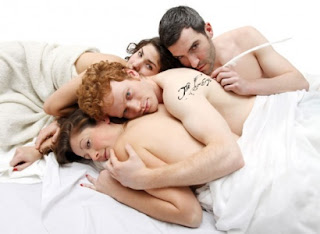kaitlyn riordan, brendan mcmurtry-howlett, sascha cole and david beazely
At the apex where theoretical and practical collide is The Apology, a seductive and wildly imaginative retelling of the early life of Mary Shelley, the author of Frankenstein (1818) brought to us from Rabiayshna Productions, written by Darrah Teitel which had a sold out run at the Next Stage Festival and closed January 16th 2011.
Mary Shelley, born Mary Wollstonecraft-Goodwin was the daughter of William Goodwin, widely considered to be the father of anarchism and Mary Wollstonecraft, widely considered to be the mother of feminism. In this play Mary, her lover Percy Shelley, her stepsister Claire and her lover (Lord) George Byron, confront both these philosophies continuously as they attempt to live in freedom, in love, and in an environment conducive to writing, to art, to poetry and to inspiration.
Teitel weaves all of these elements together gloriously, focusing on a trip that these four romantics made to Switzerland and Percy’s idealism surrounding free love and communal living. Percy is depicted as being in a committed relationship with Mary, but also wanting to be able to have sex at will with both George and Claire. Claire wants to have her stepsister’s permission to have sex with Percy, who she harbours a strong desire for, but also wishes to have sex with George, with whom she is in love, at the same time. George does not return Claire’s intense feelings, and similarly wants to be able to have sex with Mary and also with Percy. This arrangement could be described as being sexual anarchy, but it does not entirely satisfy everyone. Although Mary allows herself to be seduced by George and allows Claire to sleep with Percy, her heart seems to remain in a far more traditional and monogamous love for Percy alone. This raises issues of feminism as well, as although on the surface Mary seems to be living of her own free will, she is actually operating in a male constructed fantasy that makes her feel quite monstrous. Things become even more complicated when Mary and Claire become pregnant and they discover that perhaps their youth (for they are all teenagers at this time) and their lifestyle is far more conducive to the birth of literature than the birth of children.
Teitel gives her characters rich poetic lines and deliciously intellectual and grandiloquent musings on the state of art, their relationships with one another, the aristocracy, freedom, anarchy, sex and feminism, suggesting both how three literary geniuses and one non-artist submerged nonetheless in the culture, would have spoken to one another, and also the indulgence of being able to recline back in a castle on a lake in Switzerland and engage only in sex, art and mental masturbation.
Director Audrey Dwyer captures this sense of languid sexuality perfectly and creates a very sexually charged atmosphere for her little quartet. David Beazely brings a great haughty masculinity to George Byron, which only intensifies in his relationship with Percy. He gives the semblance of being emotionally detached from everything and everyone and only really concerned with fulfilling his own artistic and sexual needs and desires, yet Beazeley also suggests that there may be more intense and authentic feelings kept locked down deep within. Sascha Cole gives a fascinating performance as Claire, a wildly passionate girl who is in love with everyone. Yet, as giving of herself as she is, she is also very sensitive and Cole gives Claire a dignified strength of character that alludes to her ability to fend for herself. Brendan McMurtry-Howlett is equally as fascinating as Percy Shelley, as he manages to hold a lot of the power over all the other characters, but manifests it through his insatiable charm and subtlety. Kaitlyn Riordan plays Mary a bit like an ingénue. One may expect her to be a strong, fierce, feisty daughter of anarchist feminism, but in Riordan’s hands she is actually quite a vulnerable, hesitant, inwardly intelligent girl who is at the heart of the story, but grows frustrated and full of despair as the elements of her life, her sister, her friend and the man to whom she has given her heart, all seem to orbit, of their own independent will, around her, instead of being intertwined with her as in the ideal of the traditional nuclear family. This is a very poignant performance.
The Apology manages to find an astute balance between being captivating to watch, and also intelligent and penetrating in the questions that it raises about issues and ideals that are still pertinent in contemporary society. In all, this is a play that needs no apologies.







